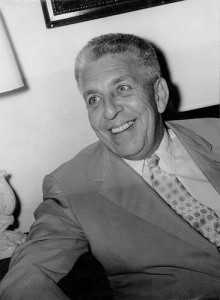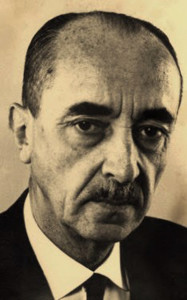Venezuela
Braghine, Col. Alexander Pavlovitch *
Col. Alexander Pavlovitch Braghine (1878-1942) is well known for his book[156]+ on Atlantis, which he considers to have been the original homeland of many of the tribes of South America. He attributes the destruction of Atlantis to the consequences of at least one close encounter between Earth and Halley’s Comet, during the Holocene period, on 7th June 4015 BC. He maintains that this intrusion upset the orbits of Earth and Venus causing worldwide destruction. Many of Braghine’s catastrophist ideas are to be found in Immanuel Velikovsky’s later books without any reference to him. Braghine on the other hand was quite willing to acknowledge any use by him of other writers’ work. Some have explained Velikovsky’s omission as being the result of perceived racism on the part of Braghine.
Braghine in his The Shadow of Atlantis mentions a tribe of white-skinned ‘Indians’ called Paria in a region of Venezuela called Atlan. He claims that their legends refer to them having an original homeland beyond the ocean that had been destroyed in a terrible cataclysm. However, I have been unable to find any other reference to this tribe apart from that of Frank Joseph[104] who locates it in the Apure region between the Orinoco River and its tributary, the Apure. Braghine’s work was also published in French[157]. A few years earlier Richard O. Marsh published White Indians of Darien [1551]+ in which he recounted his meeting with ‘white Indians’ in the remote jungles of Panama. However, claims of encounters with white Indians in Amazonia go back as far as the 16th century(a). When I saw some old photos(b) of these ‘white’ children, I was immediately struck by the fact that many were squinting and appeared to be suffering from albinism, although this has been denied(c).
Sprague de Camp lists[194] a series of errors in Braghine’s book, finishing with the ominous remark that ‘you believe Colonel Braghine at your peril.’
However, David Hatcher Childress does not shrink from correcting[620.270] the mistakes made by deCamp in his critical attack.
Your compiler found Braghine’s book interesting and informative, although rather dated as it is now (2022) over eighty years old. I could find no justification for deCamp’s condemnation of Braghine’s work.
[156]+ https://babel.hathitrust.org/cgi/pt?id=mdp.39015002694399;view=1up;seq=12
[1551]+ https://babel.hathitrust.org/cgi/pt?id=mdp.39015010699448&view=1up&seq=7&skin=2021
(a) https://en.wikipedia.org/wiki/White_Amazonian_Indians
(c) https://fdocuments.net/document/white-indians-of-darien.html?page=2 (link broken) *
Requena, Professor Rafael
 Professor Rafael Requena (1879-1946) was a Venezuelan archaeologist, doctor and politician. He was the author of several books including one in 1932; Vestigios de la Atlántida[526] in which he wrote of his belief that Atlantis was a very large island in the Atlantic that was settled by the ancient Egyptians and from there subsequently went on to develop colonies in America.
Professor Rafael Requena (1879-1946) was a Venezuelan archaeologist, doctor and politician. He was the author of several books including one in 1932; Vestigios de la Atlántida[526] in which he wrote of his belief that Atlantis was a very large island in the Atlantic that was settled by the ancient Egyptians and from there subsequently went on to develop colonies in America.
In 1934, Requena was reported in the April edition of Modern Mechanix and Inventions to have concluded that in very early times the world was divided into two large continents, North and South Atlantis and that rock inscriptions then recently discovered in Venezuela by him had been written by people from lost South Atlantis(a).
Mahieu, Jacques de
Jacques de Mahieu (1915-1990) was a French academic who spend the latter  part of his life teaching in Argentina. During the war, he was a member of the Division Charlemagne, a military unit comprised of French volunteers in the German Wehrmacht. When Paris was liberated he fled to Argentina, where he became a naturalised citizen and a professor of anthropology.
part of his life teaching in Argentina. During the war, he was a member of the Division Charlemagne, a military unit comprised of French volunteers in the German Wehrmacht. When Paris was liberated he fled to Argentina, where he became a naturalised citizen and a professor of anthropology.
He continued to espouse Nazi writing on politics and scientific racism. Following a trip to Paraguay, he announced that he had uncovered evidence of a nomadic tribe of white Indians whose ancestors had been ‘Aryans of the Nordic race’. This claim seems like an echo of the story of Colonel Braghine who reported the existence of a tribe of white natives in Venezuela. However, both the Mahieu and Braghine reports can be seen as being supported by the recent book[630] by Richard W. Welch in which he offers evidence of very early European settlers in America.
In 1985 Mahieu published Die Flucht der Trojaner[775] in which he claimed that the Trojans were originally white Libyans who had come from Scandinavia. After the Trojan War, they fled to America where they came to be known today as Olmecs!>His racist views promote the idea that all the ruling elite of the Olmecs, Incas and Maya were Trojans or Carthaginians or their descendants(b).<
He also wrote of a Templar geometric influence in America in his Les Templiers en Amérique (Templars in America) which is available as a pdf file in Italian and many other of his works in Spanish and French on the pdfarchive website(a).
(a) https://www.pdfarchive.info/index.php?pages/De
(b) Archive {4593P} (unpublished) *
